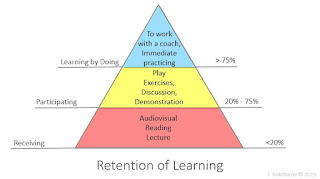Show me and I may remember,
Involve me and I’ll understand.”
This ancient Chinese proverb is as relevant today as it was
during the height of the Ming dynasty over six hundred years ago. People learn
in a variety of different manner but the retention rate of the material
presented increases dramatically when you have to get up from behind the desk
or conference table and actually get your hands on the process. After all, this
is where the theoretical meets the practical.
The concept of experiential learning or learn-by-doing is
not new. Around 350 BC, Aristotle wrote in the “Nichomachean
Ethics "for the things we have to learn before we can do them, we
learn by doing them". Unfortunately for a concept that has been around for
centuries, in my experience, I find most organizations ignoring this practical
approach and settling on the classroom PowerPoint presentation scenario. 5 days
and 1200 slides later, the students emerge from the darkened class room bleary
eyed, bored to tears and no better prepared today than they were a week ago to
attack and fix real problems. Sure they might have retained a couple knowledge
tid-bits, if they weren’t texting under the table, but was the modest value-added
gain worth 5 days?
Now compare that approach to a Boot
Camp. Solving real world problems using the necessary and appropriate Lean
& Six Sigma tools for your particular business case. Learn how to engage
and involve everyone, not just a select few.
Define the scope, gain agreement, measure current state, determine and
fix root cause, & implement sustainability measures. The trick is making
this typically complicated process simple and fast. This process results in hundreds
of improvements a year rather then 1 a quarter
If
your interested in a high intensity, action filled day with several on-site
follow ups tackling the issues that keep you up at night, join us on June 7th. (Click image above for registration details)
Otherwise don’t be surprised with the normal less than 20% learning retention
and the lack of speed and unresolved business issues that result.



